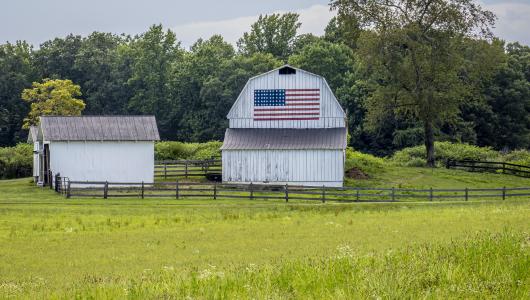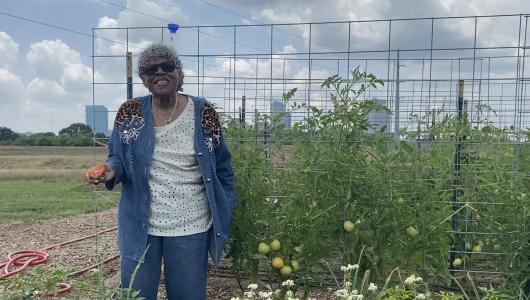Six pepper plants inspired one USDA employee’s entrepreneurial spirit to take truck farming to a whole new level – the bed of his pickup truck.
David Matthews recently drove his unconventional garden to the USDA’s weekly farmers market to showcase his green thumb and promote farmers.gov, USDA’s new website for farmers, ranchers, and foresters.
USDA employee David Matthews recently shared his unconventional garden at the weekly USDA farmers market in Washington, D.C.
“I started vegetable gardening five years ago on a whim. I started with tomato plants. Once you eat that tomato you grew yourself, it is like something you never tasted before,” said David, confidential assistant to the administrator of the USDA Farm Service Agency.
The mobile garden proved to be a big hit with market visitors and tourists who stopped by on their way to the National Mall in downtown D.C. Vibrant, healthy vegetable plants and even a lemon tree were on display. For some visitors, this was the first time they had seen these varieties of produce being grown.
“It’s very therapeutic. I like creating things and watching things grow. Spending time outside - it’s relaxing,” David shared.
Drip by drip
David also took the opportunity during the day to share another one of his micro-innovative garden creations to visitors.
One of the challenges he faced from the beginning was providing consistent, adequate water to his plants. Initially, he watered his plants by hand. However, that method didn’t allow the water to slowly filter through the soil. It was more like flood irrigation.

Given his nature, David was soon trying to come up with a more efficient method of watering plants in the truck bed. His small-scale solution – create a micro drip irrigation system that feeds from a bucket of water and targets each individual potted plant with a slow, steady application of water.
“This year I started a whole new watering system through micro-irrigation. With all the plants in the truck bed last year it was really hard to efficiently water,” he said. "The drip irrigation system mitigated that. It saved me countless hours in watering."
The drip irrigation system mitigated that. It saved me countless hours in watering.
Pepper talk
Pepper plants and peppers were also on full display and prompted the most questions. Visiting with David, it became clear he is fascinated with growing hot peppers, such as chilies for homemade salsa.
He is part of a large online community of pepper growers who share growing tips, eye watering anecdotes from eating hot peppers and information on where to find more exotic peppers such as the Carolina Reaper. Known as the hottest pepper that exists, the Carolina Reaper is one pepper that holds a fascination for Matthews.
“Last year, I grew peppers that have ranked as the hottest pepper. It’s like doing something dangerous. In other words, a person can suffer,” he said. “It will affect you so dramatically. It is so hot. Your body physiologically reacts. It is something to respect and appreciate, that level of heat.”
David’s passion for agriculture and farming was on full display at the USDA weekly farmers market.
In his unique mobile space, David also grows an Improved Meyer Lemon tree, Black Tomato, Peach Ghost and Datil hybrid pepper, Habanada pepper, Shishito pepper, Fish pepper, Corno Di Toro orange pepper, Yummy Orange sweet pepper, Sweet Basil, Dill, Rosemary, and Lavender.
For farmers, by farmers
David brings his passion for farming and innovation to the farmers.gov team, which is made up of USDA Farm Service Agency, Natural Resources Conservation Service, and Risk Management Agency employees.
Members of the farmers.gov team made sure visitors to the rolling garden received stickers and information on the customer-centric website.
Farmers.gov doesn’t deliver every agricultural resource, tool, or story for farmers, ranchers, and foresters – and it doesn’t pretend to. Instead, the farmers.gov team is talking to our customers and field employees who serve those customers, often farmers and ranchers themselves. We’re building farmers.gov around their needs and ideas through a streamlined, user-centric approach – bringing the most usable information together in a new way.
Together, we’re growing farmers.gov as a digital resource for farmers, by farmers - like David Matthews.


